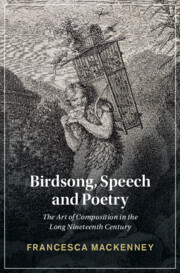Book contents
- Birdsong, Speech and Poetry
- Cambridge Studies In Nineteenth-Century Literature And Culture
- Birdsong, Speech and Poetry
- Copyright page
- Dedication
- Contents
- Figures
- Acknowledgements
- Introduction
- Chapter 1 The Science of Birdsong
- Chapter 2 The Science of Language:
- Chapter 3 ‘Prelusive Notes’
- Chapter 4 ‘Undersong’
- Chapter 5 ‘We Teach ’Em Airs That Way’
- Conclusion
- Notes
- Bibliography
- Index
- Cambridge Studies In Nineteenth-Century Literature And Culture
Introduction
Published online by Cambridge University Press: 15 September 2022
- Birdsong, Speech and Poetry
- Cambridge Studies In Nineteenth-Century Literature And Culture
- Birdsong, Speech and Poetry
- Copyright page
- Dedication
- Contents
- Figures
- Acknowledgements
- Introduction
- Chapter 1 The Science of Birdsong
- Chapter 2 The Science of Language:
- Chapter 3 ‘Prelusive Notes’
- Chapter 4 ‘Undersong’
- Chapter 5 ‘We Teach ’Em Airs That Way’
- Conclusion
- Notes
- Bibliography
- Index
- Cambridge Studies In Nineteenth-Century Literature And Culture
Summary
The introductory chapter outlines the book’s approach to renderings of birdsong in poems. It addresses recent studies which have emphasised the dangers of anthropomorphism and the poet’s consequent propensity to make the sounds of nature, in Coleridge’s phrase, ‘tell back the tale | Of his own sorrow’ (‘The Nightingale’, 1796). As the ethologist and primatologist Frans de Waal has argued, however, this scholarly obsession with anthropomorphism all too frequently slides into a form of what he terms ‘anthropodenial’: ‘the a priori rejection of shared characteristics between humans and animals’ which ‘denotes wilful blindness to the human-like characteristics of animals or the animal-like characteristics of ourselves’ and ‘reflects a pre-Darwinian antipathy to the profound similarities between human and animal behaviour (e.g. maternal care, sexual behaviour, power seeking) noticed by anyone with an open mind’ (‘Anthropomorphism and Anthropodenial’, 2009). While de Waal has called for a more open-minded approach to the study of our nearest relatives, the primates, this book sketches out a long history of ‘wilful blindness’ towards birdsong as an everyday example of the agency, skill and artfulness possessed by other creatures.
Keywords
- Type
- Chapter
- Information
- Birdsong, Speech and PoetryThe Art of Composition in the Long Nineteenth Century, pp. 1 - 19Publisher: Cambridge University PressPrint publication year: 2022

